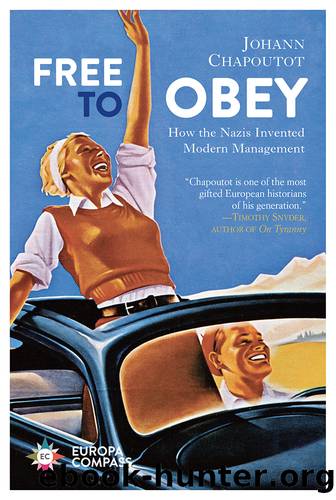Free to Obey by Johann Chapoutot

Author:Johann Chapoutot
Language: eng
Format: epub
Publisher: Europa Editions
Published: 2023-01-31T00:00:00+00:00
CHAPTER 6
THE ART OF (ECONOMIC) WAR
Military history was the passion of Reinhard Höhn the lawyer, an indefatigable polygraph and hard worker. He appears to have devoted his evenings and weekends to his hobby, with intense ruminations which resulted in several hefty volumes. Höhnâs abundant bibliographyââas lawyer, manager and amateur historianââthus includes three works on military history. One of these seems central, from a conceptual as well as a personal point of view. I refer to the study he devoted to Scharnhorstâs Legacy (Scharnhorsts Vermächtnis),73 which he published in 1952, at a time when the political elites of the young Bundesrepublik, in the middle of the Cold War, were intensely considering, with the blessing of the Western powers, the creation of a new German army. This work of reflection and reorganization led to the foundation, in 1955, of the Bundeswehr, a federal army closely associated with the West and with the democratic and individualistic principles of the new Germany. With his essay on Gerhard von Scharnhorst, a famous reformer of the Prussian army in the dark years between 1806 and 1813, Höhn announced, if not his candidacy, at least his presence in the debates and reflections of this crucial period. His book, in offering an intellectual biography of a reformer, posits a scarcely veiled analogy between one period of defeat (Prussia crushed by Napoleon at Jena and Auerstedt) and another (the collapse in 1945). It also suggests another: the great Scharnhorst being succeeded by other, more contemporary reformersâand in particular Höhn himself. The ideas proposed here are, moreover, just as valid for economic war: Höhnâs extreme attention to the reform of the managers of the army is also addressed to the managers of business enterprisesâthose modern armies. Also striking is the continuity between the ideas, themes, and obsessions of the 1930s and 1940s and those that govern Höhnâs historical and managerial work from the 1950s to the 1990s. There is no discontinuity, no break, in his fundamental intuitions, his postulates, and his principlesâapart from in his obsession with race, the Jewish peril, and the conquest of the great Lebensraum.
The first principle is the attention given to practice: in this case, to military history. In the 1930s, Höhn the lawyer had already distinguished himself through his interest in sociology, which he taught as a seminar leader, and in history. The mise en abyme is flattering: like Clausewitz, Scharnhorst was a devotee of history and practice. Nazi jurists, including Höhn, never ceased to call for an examination of the âreal,â of âindividual cases,â praising âcase lawâ (Fallrecht) and oral custom, exalting âconcrete ordersâ and sanctifying personal intuition, the âpeopleâs common sense,â in opposition to any abstraction, codification, or bookish learning. Höhnâs essay on Scharnhorst vigorously condemns âmilitary positivism,â74 just as juridical positivism had been stigmatized by Höhn and his colleagues, who saw in it a Jewish mania.
Abstraction is the rule. The rule is dogma, and dogma is death. Without deviating from the intellectual course of his Nazi years, Höhn exalts life and concrete
Download
This site does not store any files on its server. We only index and link to content provided by other sites. Please contact the content providers to delete copyright contents if any and email us, we'll remove relevant links or contents immediately.
Fanny Burney by Claire Harman(26594)
Empire of the Sikhs by Patwant Singh(23070)
Out of India by Michael Foss(16846)
Leonardo da Vinci by Walter Isaacson(13315)
Small Great Things by Jodi Picoult(7121)
The Six Wives Of Henry VIII (WOMEN IN HISTORY) by Fraser Antonia(5496)
The Wind in My Hair by Masih Alinejad(5089)
A Higher Loyalty: Truth, Lies, and Leadership by James Comey(4950)
The Crown by Robert Lacey(4805)
The Lonely City by Olivia Laing(4798)
Millionaire: The Philanderer, Gambler, and Duelist Who Invented Modern Finance by Janet Gleeson(4464)
The Iron Duke by The Iron Duke(4349)
Papillon (English) by Henri Charrière(4260)
Sticky Fingers by Joe Hagan(4188)
Joan of Arc by Mary Gordon(4099)
Alive: The Story of the Andes Survivors by Piers Paul Read(4017)
Stalin by Stephen Kotkin(3956)
Aleister Crowley: The Biography by Tobias Churton(3628)
Ants Among Elephants by Sujatha Gidla(3459)
